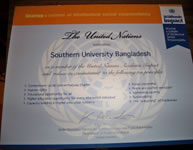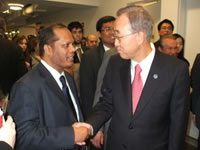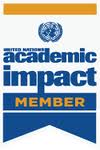


Southern University is a partner in United Nations Academic Impact, a global initiative that connects the UN with universities to pursue and sustain ten principles. Each year Southern University must actively demonstrate its support for at least one of these principles. Southern offers students unique opportunities through UN, helping to implement social and community responsibility in institutions and is getting students involved as concerned citizens
United Nations Academic Impact (UNAI), was launched by UN Secretary General Ban Ki-Moon in 2010, Southern University Bangladesh is only institutions from Bangladesh participated and become member. The basic principles of UNAI include: freedom of speech, educational opportunities, access to higher education, peace, poverty reduction, sustainability, cross-cultural understanding.
Southern University is proud to contribute to the world, educate our students to global standards, and increase our network with others in the world, we are committed to implement the UNAI initiative Statement.
United Nations Department of Economic and Social Affairs (UN DESA)- NGO Branch
The DESA NGO Branch is the focal point within the UN Secretariat for non-governmental organizations in consultative status with the Economic and Social Council (ECOSOC). Southern University is member of UN DESA- NGO branch, DESA NGO Branch aims are the following:

The idea of developing a principle-based global engagement platform for academic institutions follows from a recommendation by all academic stakeholders of the UN Global Compact. Under the coordination of the UN Global Compact and leading academic institutions, the PRME task force developed a set of six principles which lay the foundation for the global platform for responsible management education. The PRME were developed in 2007
Southern University Bangladesh Sharing Information on Progress (2016)
Letter of Commitment (2015)
As institutions of higher education involved in the development of current and future managers we declare our willingness to progress in the implementation, within our institution, of the following Principles, starting with those that are more relevant to our capacities and mission. We will report on progress to all our stakeholders and exchange effective practices related to these principles with other academic institutions:
Principle 1 | Purpose: We will develop the capabilities of students to be future generators of sustainable value for business and society at large and to work for an inclusive and sustainable global economy.
Principle 2 | Values: We will incorporate into our academic activities and curricula the values of global social responsibility as portrayed in international initiatives such as the United Nations Global Compact.
Principle 3 | Method: We will create educational frameworks, materials, processes and environments that enable effective learning experiences for responsible leadership.
Principle 4 | Research: We will engage in conceptual and empirical research that advances our understanding about the role, dynamics, and impact of corporations in the creation of sustainable social, environmental and economic value.
Principle 5 | Partnership: We will interact with managers of business corporations to extend our knowledge of their challenges in meeting social and environmental responsibilities and to explore jointly effective approaches to meeting these challenges.
Principle 6 | Dialogue: We will facilitate and support dialog and debate among educators, students, business, government, consumers, media, civil society organizations and other interested groups and stakeholders on critical issues related to global social responsibility and sustainability.
We understand that our own organizational practices should serve as example of the values and attitudes we convey to our students.